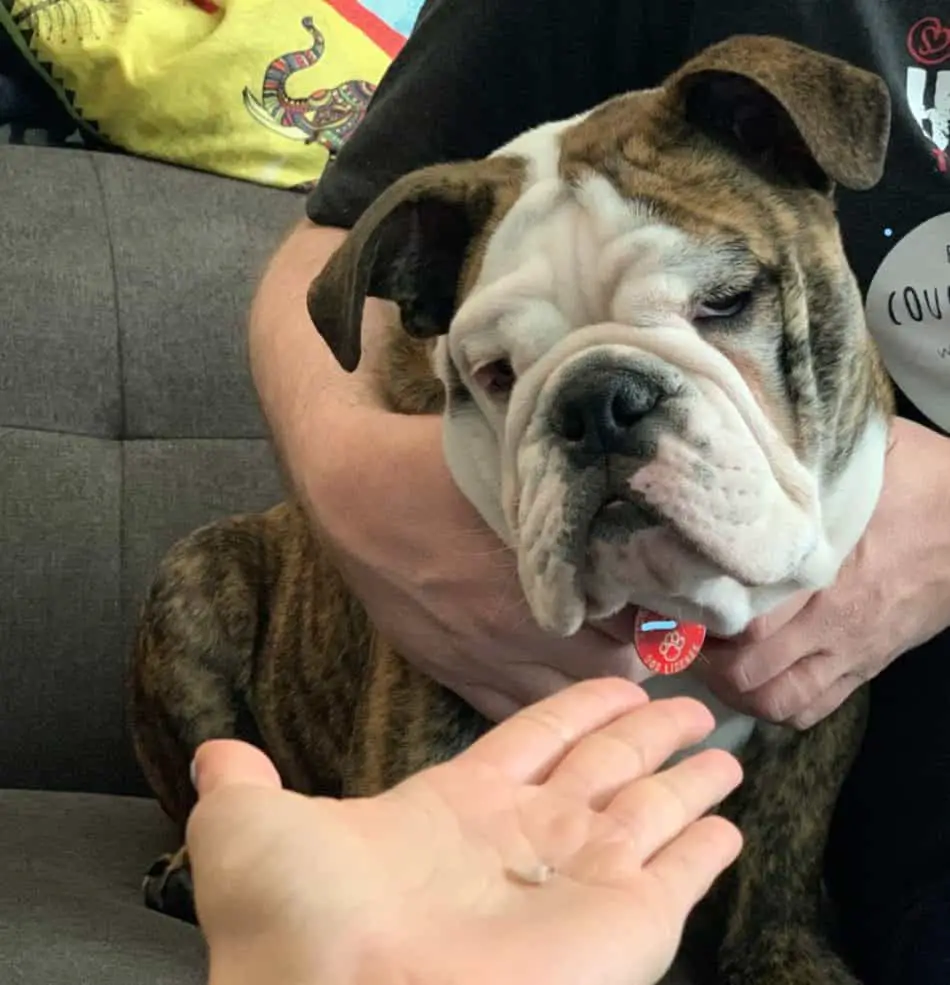If you’ve just adopted a new bulldog puppy or you’re planning on adopting one soon, congrats! Bulldogs are one of the sweetest, most dependable dog breeds on the planet and excellent around children. Sure, they might look a little grumpy due to their exaggerated facial features but, rest assured, your bulldog pup will almost undoubtedly turn into a wonderful adult dog who brings joy and love to your family for many years to come.
While you’re waiting for that to happen, however, your new bulldog puppy is going to go through a phase that might not be as pleasant. Like a human baby, a baby bulldog will go through several teething phases, including their baby teeth coming in and falling out just like other animals and humans.
Teething bulldog puppies, like human babies, can experience pain and puzzlement when going through the teething process.
The best remedy to help ease your bulldog’s pain while he/she teeths is to give them something cool or soothing to chew on. This can be chicken or beef broth flavored ice cubes, a frozen teething toy with treats inside, or some soft plush toys.

You need to be prepared to handle these phases and any change in your pup’s life that comes with them. So read on to find out How To Get Through Your Bulldog Puppy’s Teething Phase and get the info you need to get through it with flying colors.
When Do A Bulldog Puppy’s Baby Teeth Come In?
Like humans, when a bulldog puppy (or any pup for that matter) is born, they don’t have any teeth yet. This changes around the 2 to 4-week mark as their baby teeth start coming in. Usually, they will have opened their eyes at this point but still be nursing. Between 5 to 6-weeks after they’re born a bulldog puppy’s baby teeth should have all come in completely, usually about 28 teeth in total although that number can change up or down slightly.
Do Bulldog Puppies Suffer from Teething Pain?
Yes, it’s possible that they can suffer a bit. Like a human baby, there are products that you can purchase to help with this, including teething toys that you put in the fridge so that the cold reduces their pain. You can also put a medium-sized carrot in the freezer for the same results, or give your bulldog pup a bowl of large, flavored ice cubes to play with.
Although you might not hear any whining from them, there are a few signs to look for when your bulldog pup is teething and, if you see them, you should do what you can to soothe them using the methods we discussed (above and below).
- Excessive drooling and chewing on soft items
- Pawing frequently at their muzzle
- Bood spots left behind on items they’ve chewed (This is completely normal so don’t freak out.)
- A slight fever
- Softer stools
- A loss of appetite
- Vomiting and diarrhea in extreme cases
When Will Your Bulldog Pup’s Baby Teeth Fall Out?
If your bulldog puppy’s baby teeth came in normally (which they most often do) they will start to fall out around the 12 to 16-week mark, which is when you’ll likely find their little teeth here and there around the house. If you adopted your bulldog puppy around this same time it might be a bit surprising for you to find their baby teeth all over the house but rest assured that it’s 100% normal.
It’s also normal for them to have some of the most intense teething pain during this time, so be sure to have those cold treats around for them to chew on and reduce their pain and inflammation. The same signs they exhibited when their baby teeth came in will likely be exhibited now, including drooling, chewing, pawing at their muzzle and so forth.
Do Your Bulldog Puppy’s Baby Teeth Sometimes Need to Be Pulled?
Occasionally yes. There’s no real rhyme or reason for this to occur and it doesn’t always happen but, if you notice that one or more of their baby teeth are still there after they reach 6 month’s old or older, you should let your vet know so that they can be extracted.
Keep in mind that a retained baby tooth in your bulldog puppy’s mouth can cause problems and damage to the adult tooth that’s supposed to be there in its place. For example, the baby tooth could force the adult tooth to grow in out of alignment with the other teeth. A misaligned tooth can cause a lot of pain and discomfort for your bulldog as an adult, especially when eating, and so you should have it extracted as soon as possible by your vet.
How Do You Know Which Teething Stage You Bulldog Puppy is Experiencing?
The easiest way to know this is simply to know exactly when they were born and then count forward week by week to approximate what teething phase they should be in. Also, keep in mind the symptoms and outward signs that we described (above).
- 1 to 2 Weeks – No teeth
- 2 to 4 Weeks – Baby teeth coming in
- 5 to 6 Weeks – All baby teeth should have come in
- 12 to 16 weeks – Baby teeth start to fall out while adult teeth come in
- 6 Months or older – All adult teeth should have come in
An adult bulldog pup, like most other breeds, will have approximately 42 adult teeth, which is about 10 more teeth than the average human.
Helpful Tips to Get your Bulldog Puppy Through All their Teething Phases
To help bulldog puppies stay as comfortable as possible (and help you sleep at night), here are a few tips that you can use to reduce their discomfort during teething.
- Make chicken or beef broth ice cubes. The flavor will attract them to eat and the cold will soothe their sore mouth
- Gently rub their gums with your finger while they sit on your lap. This is comforting and soothing at the same time, but beware; those baby teeth can be pretty sharp!
- Purchase a puppy teething toy that you cool in the refrigerator
- Feed them softer foods that are easier to chew
- Feed them foods that are slightly warmed up
- Feed them by hand if they don’t want to eat (but don’t force them)
Is Teething Dangerous for your Bulldog Puppy?
The short answer here is ‘no’. Teething is a normal part of every bulldog pup’s life and they usually get through it just fine. On the other hand, while they’re teething they will want to chew on just about everything and, if they find something that’s harmful (or fatal) to their health they could get into trouble. That’s why, during this trying phase of their puppyhood, you should keep plenty of puppy chew toys around for them to chew on and make certain that they don’t have access to anything that shouldn’t go in their mouth. (A crate might be the answer also. See below.)
What Products Can You Give to your Teething Bulldog Puppy?
Just the same as with human babies there are plenty of products that you can purchase for your bulldog puppy that can help them get through their teething phases. Some are better than others so ask for recommendations from your veterinarian and read online reviews before purchasing so that you and your bulldog pup get the best, most soothing results.
- EETOYS Puppy Teething Toy
- Petstages Dog Toy
- KONG Puppy Toy
These are just a few of the examples of products that you can purchase for your bulldog puppy to keep them comfortable when they are going through all of the different teething stages. Also keep in mind that there are some things you can make yourself that we already mentioned, like flavored ice cubes, that will work just as well and save you the cost of whichever toy you might buy.
Should You Crate Your Teething Bulldog Puppy?
The answer to this question depends on whether you will spend most days with your bulldog puppy or if you’re not able to do that due to work and other responsibilities. The fact is that, during teething, your bulldog pup will want to chew on everything and that can cause problems for both you and your puppy.
Yes, they may not like being crated and they might whine and cry, but if you want to be 100% certain that they won’t get into trouble chewing stuff when you’re gone crating them is the only way. On the other hand, if you have the luxury of staying home with them through their teething phases then crating them might not be necessary. Some people like to crate their dogs however so the choice to crate or not to crate is strictly up to you and your particular feeling about crating.
As With All Things, Your Bulldog Puppy’s Teething Will Pass
Watching your bulldog puppy suffer is not an easy task for anyone, to be sure, especially those of us with big hearts. You’ll want to do everything you can and, oftentimes, will feel like you’re not doing enough to help your baby bulldog. Just the fact that you’re reading this article, however, suggests that you care very much and so, know this; this too will pass.
Within a few weeks, your bulldog will get through both baby teeth teething and adult teeth teething, most likely with only a few days where they are really in pain. Then it’s up to you to make sure that, with all their adult teeth in place, you take care of them so that they stay strong and healthy.
Brushing your bulldog’s teeth regularly is vital, as well as taking them to your veterinarian regularly to get their teeth checked and professionally cleaned. If you do that, the memories of all that pain and anxiety will soon be forgotten.
We hope you liked this article and that it answered all of your questions about bulldog puppy teething. If you have more questions or would like to leave a comment please do so in the space provided, and best of luck with your new bulldog puppy!
Sources:
https://www.thehonestkitchen.com/blog/puppy-teething-hurts-tips-to-get-through-teething/
https://www.cuteness.com/article/english-bulldog-puppy-teething-information
https://www.caninejournal.com/
https://www.akc.org/expert-advice/health/timeline-of-puppy-teething/

